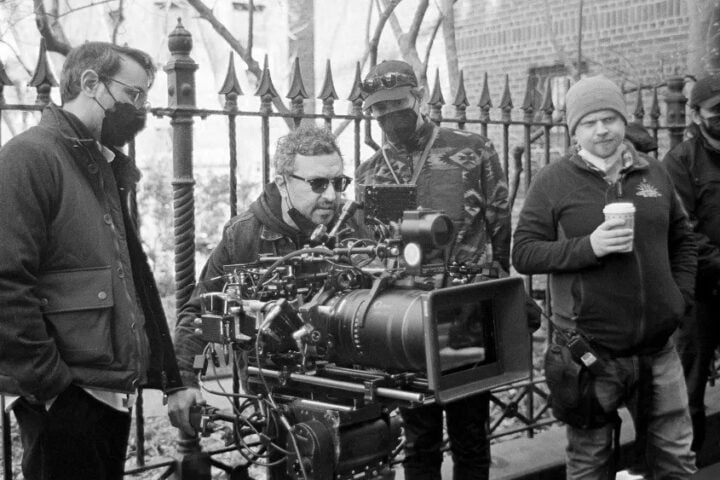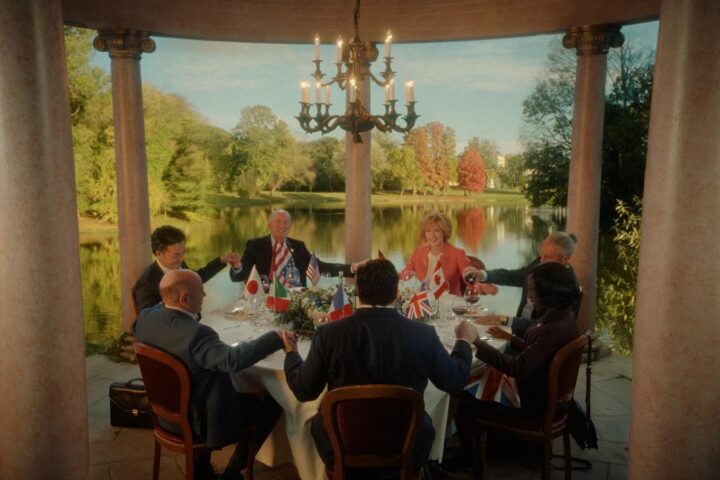Set at a restaurant that caters to tourists in Times Square, Alonso Ruizpalacios’s La Cocina, adapted from Arnold Wesker’s 1957 play The Kitchen, revolves around Pedro (Raúl Briones), an undocumented Mexican line cook, and Julia (Rooney Mara), a white American working front of house. When $800 goes missing from the till, triggering an investigation by restaurant management, their love story derails. Throughout, Ruizpalacios allows the Grill to be both exactly what it is—a specific workplace with its own Kitchen Confidential-style rituals and pecking order—and a microcosm of American capitalism. “American” in the broadest sense since, as Pedro reminds us, “America is not a country.”
In an important scene, the Grill’s second-generation Mexican American manager, Luis (Eduardo Olmos), is interrogating Pedro, whom he suspects of having stolen the money to pay for the abortion that Julia wants and, coincidentally, would cost $800. While the intransigent line cook sidesteps Luis’s questions with seeming digressions on history, the screensaver on the manager’s computer monitor is in the dead center of the frame. It’s a facsimile of the 3D Maze that first appeared on PCs with Windows 95, except without solutions or corporate logos. As the conversation between Pedro and Luis intensifies, the camera slowly zooms in until the screensaver fills the entire frame, transforming an insignificant detail into an overriding theme.
This image makes the subtext of La Cocina explicit. For one thing, the plot is also structured like a labyrinth. Most of the important events have already occurred before the film begins, and our entry point is via the perspective of a minor character, Pedro’s relative Estella (Anna Díaz), who leverages her connection with him to land a job at the restaurant. There are enough characters in the film to populate an epic novel, from all over the world (Mexico, Dominican Republic, Columbia, Haiti, Morocco). They communicate in a volatile mix of English, Spanish, French, and Arabic verbal abuse, only half in jest, now and then breaking into self-conscious soliloquy.
This ethnic and linguistic tangle reflects the movement of the camera within the space of the film. La Cocina abounds in dolly shots that probe the Grill’s passageways, evoking the camerawork not only of The Shining and Birdman, but also Jorge Luis Borges’s explorations of the labyrinth motif in short stories like “The Garden of Forking Paths.”
But cinematographer Juan Pablo Ramírez’s camera also employs tracking shots that contribute to a sense that the Grill (and everything that it represents) lacks real depth—that it’s a space in which no forward progress is possible. All but a handful of scenes take place inside the restaurant’s cramped and dingy corridors, such that the screensaver only ironizes the uncut transitions between scenes and spaces. Between the feeling of smooth interconnectedness, and that of a self-containment bordering on the claustrophobic, the line is porous.
Ruizpalacios’s vision of the kitchen as a hellish assembly line is crowned by a long take of a lunch rush where everything that can go wrong does, the chaos ratcheted up by the relentless racket of the ticket printer over the soundtrack, spitting out order after order. Rather than comforting homily—that, say, despite differences of race and class and country of origin, we pull together in this melting pot of freedom and opportunity—La Cocina offers a bleaker perspective on this America in miniature. Thanks to a miscommunication, a broken soda fountain floods the kitchen, turning the overcrowded space into a sinking ship from which there’s no escape.
La Cocina goes further than recasting the American dream as a nightmare and the much sought-after visa as a ticket to infinite exploitation. As Pedro says in response to the modest dreams that his coworkers share on break after the lunch rush, “You want more. Something more.” Like its protagonist, Ruizpalacios’s film expresses a distrust of dreams and wish-fulfilment, yet it’s hardly a work of realism. La Cocina’s most overtly fantastical element, motivating one of only two scenes that depart from its black-and-white palette, turns out to be doubly pessimistic, suggesting that our dreams of escape only lead us deeper into the labyrinth. Ironically, then, La Cocina falls into the classic trap of realism, never offering a glimpse beyond the futility it so strikingly envisions, and so desperately condemns.
Since 2001, we've brought you uncompromising, candid takes on the world of film, music, television, video games, theater, and more. Independently owned and operated publications like Slant have been hit hard in recent years, but we’re committed to keeping our content free and accessible—meaning no paywalls or fees.
If you like what we do, please consider subscribing to our Patreon or making a donation.



